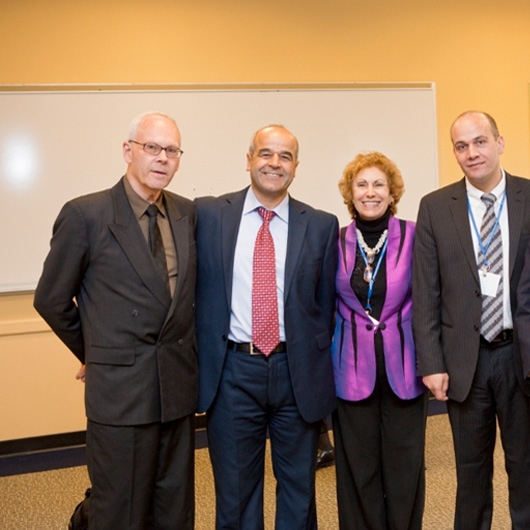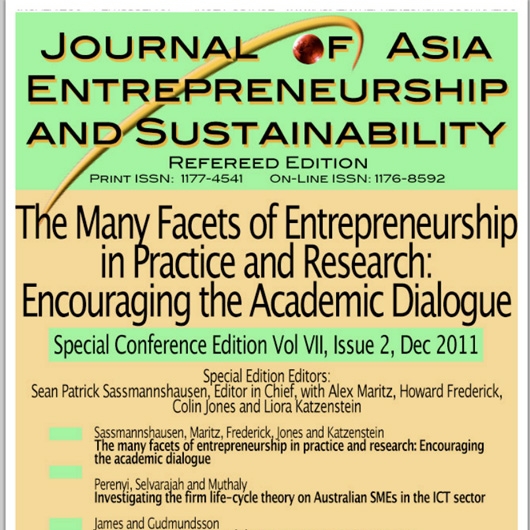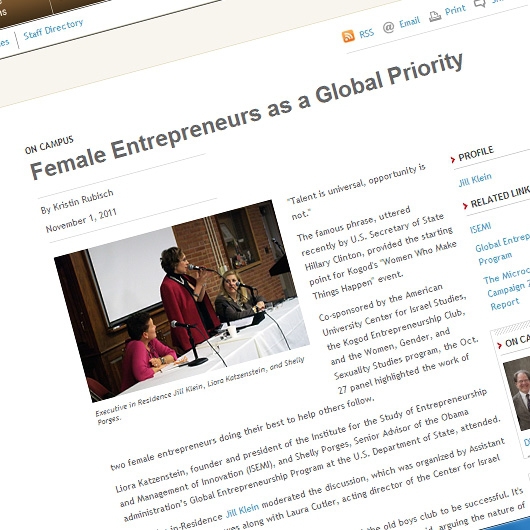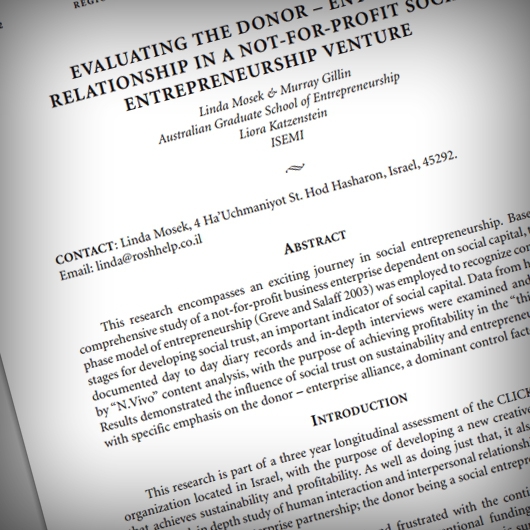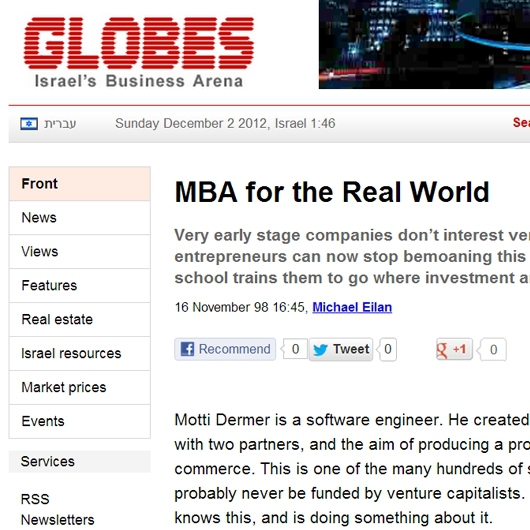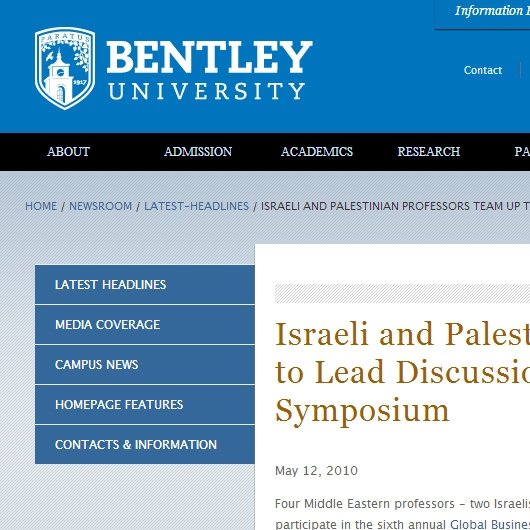Marblehead resident Bob McNulty, the director of programs at Bentley University's Center for Business Ethics, brought together Israeli and Palestinian professors recently to talk about the role business can play in the peace process. From left are Israeli professor Eugene Jaffe, Dr. Samir Abuznaid of Palestine, Israeli professor Liora Katzenstein, McNulty and Palestinian assistant professor Mohammed Bader.
THE MANY FACETS OF ENTREPRENEURSHIP IN PRACTICE AND RESEARCH: ENCOURAGING THE ACADEMIC DIALOGUE
The famous phrase, uttered recently by U.S. Secretary of State Hillary Clinton, provided the starting point for Kogod's "Women Who Make Things Happen" event.
This research encompasses an exciting journey in social entrepreneurship. Based on a comprehensive study of a not-for-profit business enterprise dependent on social capital, the three phase model of entrepreneurship (Greve and Salaff 2003) was employed to recognize comparative stages for developing social trust, an important indicator of social capital. Data from historically documented day to day diary records and in-depth interviews were examined and evaluated by “N.Vivo” content analysis, with the purpose of achieving profitability in the “third sector” Results demonstrated the influence of social trust on sustainability and entrepreneurial growth; with specific emphasis on the donor – enterprise alliance, a dominant control factor.
Very early stage companies don’t interest venture capital funds, but entrepreneurs can now stop bemoaning this fact. A new Israeli business school trains them to go where investment angels fear to tread.
Four Middle Eastern professors - two Israelis and two Palestinians - will come together at Bentley University to participate in the sixth annual Global Business Ethics Symposium and the four-day Global Business Ethics Teaching Workshop that follows. To begin the week, the professors will lead a panel discussion titled, "The Business of Peace: Seeking a Sustainable Future for the Israeli and Palestinian Peoples" as part of the Symposium that will be held on May 17, 2010, followed by the Teaching Workshop held from May 18 to May 21. Both the Symposium and Workshop are made possible through sponsorship from the State Street Foundation, Inc.
GateHouse News Service
But Marblehead resident Bob McNulty found an opportunity to change things when he brought together two groups of professors to take part in Bentley University's weeklong global ethics seminar as part of a business-for-peace initiative.
"What we are trying to do is to look at the issue not at the summit level but on the valley level," McNulty explained. "It was important to find people of high esteem who recognize the need to find peaceful means to work together to further the peace process."
Taking a break from a flurry of meetings held during the week, McNulty, the director of programs for the university's Center for Business Ethics, stopped to talk about the seminar with the academics whom he had brought in for the event, including Dr. Samir Abuznaid of Palestine, Israeli professors Eugene Jaffe and Liora Katzenstein, and Palestinian assistant professor Mohammed Bader.
Far away from their conflicting homelands, two Israeli and two Palestinian business professors met for the first time recently on American shores, even going as far as to share personal stories of success and struggles during a weeklong event that culminated with a party in Marblehead.
"What we are trying to do is to look at the issue not at the summit level but on the valley level," McNulty explained. "It was important to find people of high esteem who recognize the need to find peaceful means to work together to further the peace process."
Taking a break from a flurry of meetings held during the week, McNulty, the director of programs for the university's Center for Business Ethics, stopped to talk about the seminar with the academics whom he had brought in for the event, including Dr. Samir Abuznaid of Palestine, Israeli professors Eugene Jaffe and Liora Katzenstein, and Palestinian assistant professor Mohammed Bader.
Far away from their conflicting homelands, two Israeli and two Palestinian business professors met for the first time recently on American shores, even going as far as to share personal stories of success and struggles during a weeklong event that culminated with a party in Marblehead.
During the week, friendships developed between the professors, which, in their respective homelands, would be a rarity.
For more than six decades, Arabs and Israelis have been embroiled in a raging conflict that has no end in sight, one marked by failed government peace initiatives. The conflict has caused immense suffering for both groups of people. In many instances, Israelis and Palestinians stand in opposition to one another, rarely having the chance to come together.
But Marblehead resident Bob McNulty found an opportunity to change things when he brought together two groups of professors to take part in Bentley University's weeklong global ethics seminar as part of a business-for-peace initiative.
"What we are trying to do is to look at the issue not at the summit level but on the valley level," McNulty explained. "It was important to find people of high esteem who recognize the need to find peaceful means to work together to further the peace process."
Taking a break from a flurry of meetings held during the week, McNulty, the director of programs for the university's Center for Business Ethics, stopped to talk about the seminar with the academics whom he had brought in for the event, including Dr. Samir Abuznaid of Palestine, Israeli professors Eugene Jaffe and Liora Katzenstein, and Palestinian assistant professor Mohammed Bader.
Far away from their conflicting homelands, two Israeli and two Palestinian business professors met for the first time recently on American shores, even going as far as to share personal stories of success and struggles during a weeklong event that culminated with a party in Marblehead.
During the week, friendships developed between the professors, which, in their respective homelands, would be a rarity.
For more than six decades, Arabs and Israelis have been embroiled in a raging conflict that has no end in sight, one marked by failed government peace initiatives. The conflict has caused immense suffering for both groups of people. In many instances, Israelis and Palestinians stand in opposition to one another, rarely having the chance to come together.
But Marblehead resident Bob McNulty found an opportunity to change things when he brought together two groups of professors to take part in Bentley University's weeklong global ethics seminar as part of a business-for-peace initiative.
"What we are trying to do is to look at the issue not at the summit level but on the valley level," McNulty explained. "It was important to find people of high esteem who recognize the need to find peaceful means to work together to further the peace process."
Taking a break from a flurry of meetings held during the week, McNulty, the director of programs for the university's Center for Business Ethics, stopped to talk about the seminar with the academics whom he had brought in for the event, including Dr. Samir Abuznaid of Palestine, Israeli professors Eugene Jaffe and Liora Katzenstein, and Palestinian assistant professor Mohammed Bader.
Far away from their conflicting homelands, two Israeli and two Palestinian business professors met for the first time recently on American shores, even going as far as to share personal stories of success and struggles during a weeklong event that culminated with a party in Marblehead.
During the week, friendships developed between the professors, which, in their respective homelands, would be a rarity.
For more than six decades, Arabs and Israelis have been embroiled in a raging conflict that has no end in sight, one marked by failed government peace initiatives. The conflict has caused immense suffering for both groups of people. In many instances, Israelis and Palestinians stand in opposition to one another, rarely having the chance to come together.
During the week, friendships developed between the professors, which, in their respective homelands, would be a rarity.
For more than six decades, Arabs and Israelis have been embroiled in a raging conflict that has no end in sight, one marked by failed government peace initiatives. The conflict has caused immense suffering for both groups of people. In many instances, Israelis and Palestinians stand in opposition to one another, rarely having the chance to come together.
But Marblehead resident Bob McNulty found an opportunity to change things when he brought together two groups of professors to take part in Bentley University's weeklong global ethics seminar as part of a business-for-peace initiative.
